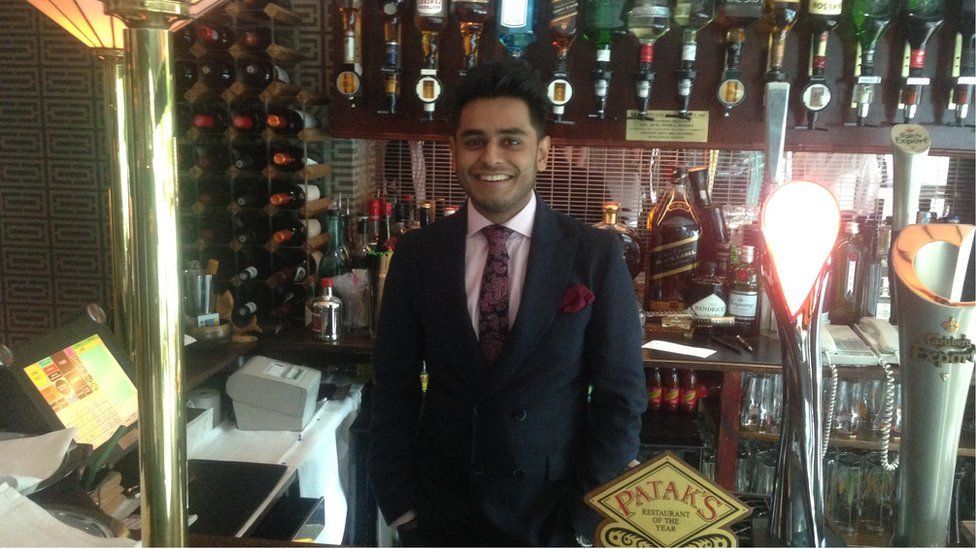Who will cook your Indian curry?
- Published

A pinch of cardamom, a little coriander and a smattering of cinnamon - all ingredients not just in a great British curry but in a political row that's been bubbling up in the kitchens of Indian restaurants up and down the country.
It begins with a question - where is the next generation of curry chefs going to come from - and ends in with another - would leaving the EU save your local Indian from closing?
Currently two or three curry restaurants are shutting every week.
Now, you may think you know the answer to where Indian chefs come from. If so think again.
For decades your "Indian" - whether a chicken tikka masala or late night vindaloo - was almost certainly cooked by a chef from Bangladesh or, perhaps, someone whose father was.
Not any more though. The voices you hear in a growing number of kitchens above the noise of the chopping and the sizzling are the voices of East Europeans - in particular Romanians.
The reason is that tougher immigration rules mean it simply costs too much for most restaurants to bring new chefs over here.
A decade or so ago a curry chef would earn around £15,000 a year. Now, a restaurant has to pay almost double that as well as jumping a series of complex bureaucratic hurdles to persuade the Home Office to allow them to bring in a chef from abroad.
"Abroad" means, of course, not from outside the UK but outside the EU.
Pasha Khandakar, the president of the Bangladesh Caterers Association, told me that this was an "immigration double standard".
"We've been told by British ministers to import European Union people," he said, pointing to a "language problem, a culture problem and a smell problem." He contends that Eastern European workers dislike the smell of curries.
"We have to give chance for everyone in this world who's fit for these jobs - not for their colour, not for their geographical identity."
'Save the curry industry'
"Why should it be easier and cheaper to hire a Romanian to work in a curry house than a Bangladeshi?" many British Asians ask.
Why, indeed, should it be so easy for Eastern Europeans to bring their families to live with them when it is now so much harder than it once was for the families of British people with Commonwealth roots to do the same?
It is the widespread feeling that immigration rules now discriminate against them and their families which Brexit campaigners have sought to tap into.
Indeed, the employment minister and prominent Leave campaigner, Priti Patel, has claimed that a vote to quit the EU is the only way to save the curry industry.
That depends on a very big assumption. That following Brexit the British public would become so relaxed about immigration that politicians felt able to relax the immigration rules that stop low paid and low skilled workers coming here from elsewhere.
At Le Raj in Epsom - an upmarket restaurant in Surrey which is a favourite of Chris Tarrant and Heston Blumenthal - that's not how they see things.
The head chef here is a Bangladeshi. Recently he's had to brush up on his language skills - to learn not English but Romanian.
His kitchen is manned now by people who had never smelt a curry never mind cooked one before coming to work under his tutelage.
Unlikely to change?
The boss of the Raj, Jeffrey Ali, is as frustrated as anyone in his industry with the current immigration rules but he tells me that he simply does not believe any politician will want "to touch relaxing the rules with a 10 foot pole".
"If immigration were to be brought down, even by half, there would still be no onus from any politician to say, 'Ok now because we have less people coming from the EU, let's bring in more people from the Commonwealth,'" said Mr Ali, who plans to vote Remain in the referendum.
Not least when unemployment is high amongst the British Bangladeshi community whose children choose, he argues, to claim benefit rather than to take the relatively low pay and long hours that their parents once worked as waiters or chefs.
Brexit, he believes, offers a false dawn for an industry that needs to do more to raise its status and to train the next generation of chefs.
Jeffrey Ali is helping to sponsor a new academy down the road to teach cooking to young British born people in the hope that one day he will not be forced to choose between immigrants he cannot afford and those who know as much about curry as he knows about Romanian cuisine.
Immigration is the main reason people who plan to Vote Leave give for their choice.
What's clear, though, is that even if we do vote to quit the EU on the 23rd June the debate about how much immigration we need and want and can afford as a country will stay firmly on the menu alongside the question - who will cook and serve my Indian in the future?
- Published23 May 2016
- Published25 May 2016
- Published26 January 2016